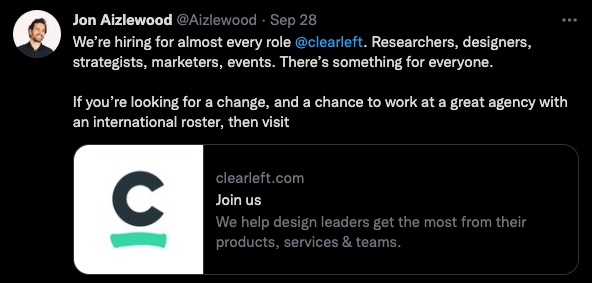Digests: Ins & Outs
Ins
The past few weeks (months?) have been spent interviewing for new hires at Clearleft.
It’s not easy finding the right candidates of late. Due to Covid it seems the entire job market is all over the place, and lots of people are on the move.
Speaking of changes, our hiring process has come on leaps and bounds since I was hired many, many moons ago. We now have a much more sophisticated setup and approach, bolstered by a subscription to a DEI-focussed product called BeApplied.
Those changes started when hiring for a role several months ago. We tried a ‘blinding’ of incoming CVs, making them anonymous. It was a novel experience and was done manually by a colleague (thanks! 😉). Laborious perhaps, but also hugely beneficial in removing the inevitable biases and snap judgements we all make every day, both good and bad.
The blinding worked well enough to start every candidate off on the same footing, from an employer’s point of view. Incidentally, this blinding approach is exactly what the BeApplied product now does automatically, amongst many other useful features.
Our basic interview process
From the blinded CVs we arrange and conduct ’screener’ interviews. 30 minutes, informal and a chance to get to know the candidate better. These are done either by phone or video call.
Once all screeners are finished, the candidates are ranked accordingly. The best candidates are invited for a formal interview.
Our interviews are typically 1.5 hours long, attended by at least 1 other colleague, and follow an agenda that looks something like this:
- What's your story? (20 mins)
- How do you work? Plus task or brief (30 mins)
- Where are you headed? (20 mins)
- Q&A (20 mins)
The task or brief bit is important (and applicable mainly to practitioners like designers and developers). Back in the day when hiring designers we created a pretty comprehensive design task, expecting screen designs, branding, process, the works. Perhaps at the time it was more commonplace, but these days I don’t agree with setting tasks for designers*. They assume everyone has ample time and space, which realistically isn’t the case for most people.
Today we set an open-ended creative brief or problem space, and ask the candidate to spend no longer than 30 mins thinking it through.
*Front-end developers are a different story. After several ‘are you sure’ questions, I’ve been assured that tasks for developers are commonplace, accepted and largely appreciated.
Setting a small brief
The brief resembles a Frankenstein’s monster of client briefs we’ve had in the past. It’s absolutely not spec work, and therefore fiction. What we’re looking for is how they approach the problem, what questions they ask, how they communicate their approach and where they focus their efforts. We send the brief along with the agenda about a week before the actual interview, allowing the candidate the time to consider their approach, formulate questions and prepare any answers.
Just like workshops with clients, the magic is in the conversation, not the things on a wall/screen. Listening to their approach shares loads of insights into how they think, how they work and how they might conduct themselves in front of both clients and peers.
Next steps
If the first interview went well we line up a second, where the candidate meets more of the team they’d be working with on a day-to-day basis. An offer is made, contract drawn up, and we have a new starter.
Outs
If that’s all about bringing folks in to Clearleft, then there’s bound to be some folks going out right?
By mutual consent, I’m leaving Clearleft (again 🙃) before the New Year. I left the first time as a practicing Designer (doing & projects), and I leave this time as a Design Director (leading & managing).
I can't lie though... it’s been a bumpy ride, managing an agency through Covid. The gif below sums it up.
I've dealt with a lot of stuff in a short space of time. Some that's par for the course, some that's way above and beyond. It's caused burn out a few times, broken me at times, and it's reached a point where it's simply time to call time. ⌛️
I’ve learned a lot in three-ish years since going back, which I’ll write about soon. But for now it’s a farewell from me. After a non-consecutive 9 years as a permanent employee (even longer given I was freelancing with Clearleft before I joined full-time) it's bittersweet, but necessary.
So I'm leaving to take stock, recharge and then focus on some really exciting new challenges. Watch this space.
December 1st, 2021
